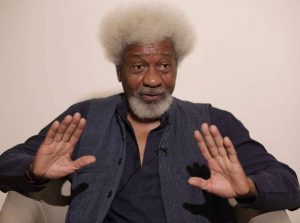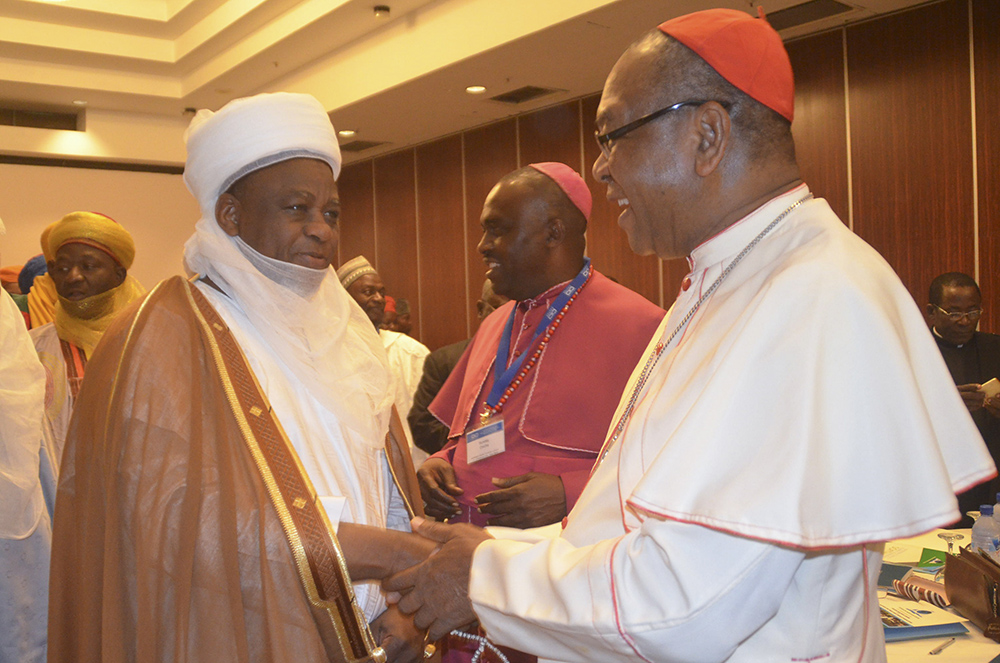It is a fairly known joke in Nigerian newsrooms that only the late Dr Stanley Macebuh was used to editing Nobel laureate, Wole Soyinka, contrary to Soyinka’s standing order against trifling with his texts in the name of editing. And those who were witnesses to this said Macebuh did it so skillfully that Soyinka would most often not even notice that someone had edited him. Intervention has no ambition to risk the Macebuh pathway except that, this time, the full text of what many would consider as Soyinka’s most important recent outing is not available immediately.

An angry Kongi!
Hence, this cut and paste approach from what are already out there in the social and traditional media from a session the Nigerian writer had with Dr. Louisa Egbunike, introduced as a Professor of African Literature.
The last time a national figure hit at the rise of the current wave of religiosity in Nigeria must be the memorable outing in February 2016 by Archbishop Ignatius Kaigama when he took umbrage at what he calls “market place prophecies and visions, charismatic display of talents and material salvation”. That was in February 2016 when he warned Catholic priests against “melo-dramatic displays that look like modern broad-way shows”, insisting on Catholic priests avoiding “flamboyant spirituality and noisy liturgy” in favour of teaching the people values of internalised prayers from the heart. He further advocated for emphasise on “sober Christianity without tricks, rhetoric, fanfare and the craze for social media publicity”, warning priests against the temptation to compete with trendy pastors in seeing visions and uttering prophecies to which he attributed ‘psychological disposition’
And, as a columnist, the current Minister for Education, Mallam Adamu Adamu warned against road closure and the misuse of the loud speaker by Muslims. He did that several times in his now rested column in Abuja based Daily Trust.
So, it seems there is unease against the trend in the spaces which matters most. This is more so that Soyinka has entered into the debate over fancy, instrumental religiosity in Nigeria. It remains to see what happens next. Here, we go:
“All over the place, I find that religion has been cosseted too much. And liberty has been taken by religionists, which would not be considered to other movements which are considered secularists.
If you put on a garb of a religious leader, you can close up the expressway between Lagos and the rest of the nation, simply because you are having a religious celebration. You are just a fraction of the rest of the nation. And you should be accorded no special privileges. So, until that is done, people will always find something extra by belonging and manifesting, even to an extreme extent, your religious adhesions.
Religion has become the number one problem for Nigerians. Hope is all very well; but hope itself can become putrid. Especially if it is hope for unearned advantages in society. If religion becomes an excuse for flouting the law, then that religion has got to be tackled head-on.
If for instance a legislator, later a Governor, can claim the right to be a pedophile and indulge in cross-border child trafficking, celebrating child marriage, consummating that event, which is against the law of a nation, and he says he has a right to do it because his religion permits it; then both he and that religion should just be shown the way to the law courts and treated like other phenomena of society.
If you can use religion to excuse building a church which collapses on the head of humanity, many of them not from Nigeria, several from South Africa. And then you say it was caused by supernatural forces when you know very well that you flouted the conditions for increasing the floors of your building.
So this is what has become the daily reality of Nigerians. So religion has got to be put in its place in order for people to be liberated as rational beings, beings of volition, who can tackle the problems of existence in a rational, collective way, rather than by insisting that it is only along one route that society can be transformed.
Take a religion, practice it at home, collect around you anybody you want for collective celebration or religious seasons, nobody quarrels with that. But when you use religion to subvert the rights of others, to the extent of primordial rights, to kill, not just singling, but collectively, to burn down the places of worship of others; then it is about time we treated religion as a crime against humanity; it’s reached that level in societies like Nigeria”




























